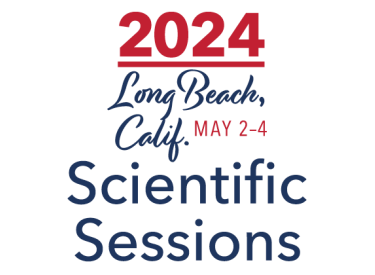Long Beach, Calif. – The annual Society for Cardiovascular Angiography & Interventions (SCAI) meeting, SCAI 2024 Scientific Sessions, will kick off on Thursday, May 2, bringing together more than 1,800 clinicians, scientists, researchers, and innovators in the field of interventional cardiology and endovascular medicine. The meeting will take place at the Long Beach Convention Center Thursday, May 2 through Saturday, May 4, presenting the latest cutting-edge advances in cardiovascular research, prevention, and care.
With more than 500 faculty and about 450 abstracts, experts in the field work together to share the latest clinical data, procedural guidance, and advanced expertise.
Heart disease has been the leading cause of death in the United States since 1950, and as one of the most prevalent health conditions, impacting half of all Americans. According to the Centers for Disease Control and Prevention (CDC), heart disease and stroke rank as the first and fifth leading causes of death in the nation. These conditions affect millions of individuals across the country each year, with more than 877,500 Americans experiencing symptoms related to heart disease, stroke, or other cardiovascular diseases annually. This prevalence underscores the urgent need for heightened awareness, prevention strategies, and access to quality healthcare services to combat the detrimental effects of cardiovascular diseases on public health.
“At this year’s SCAI Scientific Sessions, we are seeing a broad range of clinical trials and emerging science all with the same aim – improving patient outcomes and experience. Featuring numerous abstracts with fresh insights into health disparities, efficacy data for TAVR, and innovative strategies for PAD, we eagerly anticipate the convergence of professionals from diverse specialties. Their teamwork and collaboration, allows us to advance collective efforts within this sector, driving forward innovation and enhancing patient care”, said SCAI Interventional Cardiology Program Chair, J. Dawn Abbott, MD, FSCAI.
Key themes to be discussed at the meeting include:
- New Research: As a common non-surgical procedure used to treat blockages in a coronary artery, around 900,000 percutaneous coronary interventions (PCIs) are performed every year in the U.S. This new study looks at the trends and clinical outcomes with radial versus femoral arterial access for PCIs.
- Late-breaking oral presentation: Temporal Trends and Clinical Outcomes with Radial Versus Femoral Arterial Access for Percutaneous Coronary Intervention in the United States
- Date and Time: Thursday, May 2 9:17-9:24 AM PT
- Late-breaking oral presentation: Temporal Trends and Clinical Outcomes with Radial Versus Femoral Arterial Access for Percutaneous Coronary Intervention in the United States
- Transcatheter Aortic Valve Replacement (TAVR): TAVR is a minimally-invasive procedure to replace an aortic valve that is narrowed and doesn't open fully, which can help reduce chest pain, shortness of breath and other symptoms of aortic valve stenosis. About 276,000 patients have undergone a TAVR procedure in the United States. This year’s meetings will feature presentations focusing on TAVR including:
- Late-breaking oral presentation: Self-Expanding Versus Balloon-Expandable Transcatheter Aortic Valve Replacement in Patients with Small Aortic Annuli: Additional Outcomes from the SMART Trial
- Date and Time: Friday, May 3 2:44-2:51 PM PT
- Late-breaking oral presentation: Self Update from the First-in-human study with the novel DurAVR biomimetic transcatheter heart valve
- Date and Time: Friday, May 3 10:55-11:00 AM PT
- Late-breaking oral presentation: Self-Expanding Versus Balloon-Expandable Transcatheter Aortic Valve Replacement in Patients with Small Aortic Annuli: Additional Outcomes from the SMART Trial
- Peripheral Artery Disease (PAD): According to a recent survey, 70% of Americans are unaware of PAD – the most common vascular disease in which leg arteries become narrowed, reducing or cutting off blood flow. PAD contributes to 400 amputations each day. This year’s meetings will feature several studies addressing PAD including:
- Late-breaking oral presentation: Revascularization strategies in patients with peripheral arterial disease involving the femoropopliteal arteries: A pooled analysis of individual patient data
- Date and Time: Friday, May 3:12-3:19 PM PT
- Late-breaking oral presentation: Revascularization strategies in patients with peripheral arterial disease involving the femoropopliteal arteries: A pooled analysis of individual patient data
“We are proud to offer over 80 sessions in a variety of interactive educational formats at this year’s meeting. We believe the tools, resources, and information shared at the meeting will provide the healthcare community with greater expertise to improve patient outcomes and also connect with their interventional cardiology colleagues,” said SCAI President George D. Dangas, MD, PhD, MSCAI.
Follow #SCAI2024 on X for real-time updates and emerging news from the meeting.
Scientists, clinicians, and members of SCAI leadership will be available for interviews to further discuss specific sessions and innovations in interventional cardiology and endovascular medicine. Click here for more registration information.
About SCAI 2024 Scientific Sessions
The SCAI Scientific Sessions annual meeting convenes 1,600+ of the world’s pristine clinicians, scientists, researchers, and innovators in the field of interventional cardiology and endovascular medicine. With 500+ faculty and 270+ abstracts, experts in the field work together to share the latest clinical data, procedural guidance, and advanced expertise. Highlights will include live cases, featured clinical research, new SCAI clinical documents, case-based learning, and keynote speakers. For more information,
Press Contacts:
Gavin Stern
[email protected], 202-644-8561
Katy Frame
[email protected], 610-613-3549
What's Happening at SCAI
Updates on the Society's publications, advocacy initiatives, fundraising, professional recognition programs, research, and collaborations with partners.

